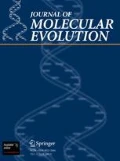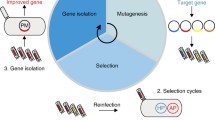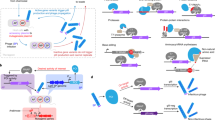Abstract
To explore the possibility that an arbitrary sequence can evolve towards acquiring functional role when fused with other pre-existing protein modules, we replaced the D2 domain of the fd-tet phage genome with the soluble random polypeptide RP3-42. The replacement yielded an fd-RP defective phage that is six-order magnitude lower infectivity than the wild-type fd-tet phage. The evolvability of RP3-42 was investigated through iterative mutation and selection. Each generation consists of a maximum of ten arbitrarily chosen clones, whereby the clone with highest infectivity was selected to be the parent clone of the generation that followed. The experimental evolution attested that, from an initial single random sequence, there will be selectable variation in a property of interest and that the property in question was able to improve over several generations. fd-7, the clone with highest infectivity at the end of the experimental evolution, showed a 240-fold increase in infectivity as compared to its origin, fd-RP. Analysis by phage ELISA using anti-M13 antibody and anti-T7 antibody revealed that about 37-fold increase in the infectivity of fd-7 was attributed to the changes in the molecular property of the single polypeptide that replaced the D2 domain of the g3p protein. This study therefore exemplifies the process of a random polypeptide generating a functional role in rejuvenating the infectivity of a defective bacteriophage when fused to some preexisting protein modules, indicating that an arbitrary sequence can evolve toward acquiring a functional role. Overall, this study could herald the conception of new perspective regarding primordial polypeptides in the field of molecular evolution.
Similar content being viewed by others
Author information
Authors and Affiliations
Rights and permissions
About this article
Cite this article
Hayashi, Y., Sakata, H., Makino, Y. et al. Can an Arbitrary Sequence Evolve Towards Acquiring a Biological Function? . J Mol Evol 56, 162–168 (2003). https://doi.org/10.1007/s00239-002-2389-y
Received:
Accepted:
Issue Date:
DOI: https://doi.org/10.1007/s00239-002-2389-y




